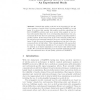Free Online Productivity Tools
i2Speak
i2Symbol
i2OCR
iTex2Img
iWeb2Print
iWeb2Shot
i2Type
iPdf2Split
iPdf2Merge
i2Bopomofo
i2Arabic
i2Style
i2Image
i2PDF
iLatex2Rtf
Sci2ools
95
Voted
IFIP
2004
Springer
2004
Springer
802.11 Link Quality and Its Prediction - An Experimental Study
Abstract. Reliable link quality prediction is an imperative for the efficient operation of mobile ad-hoc wireless networks (MANETs). In this paper it is shown that popular link quality prediction algorithms for 802.11 MANETs perform much more poorly when applied in real urban environments than they do in corresponding simulations. Our measurements show that the best performing prediction algorithm failed to predict between 18 and 54 percent of the total observed packet loss in the real urban environments examined. Moreover, with this algorithm between 12 and 43 percent of transmitted packets were lost due to the erroneous prediction of link failure. This contrasts sharply with near-perfect accuracy in corresponding simulations. To account for this discrepancy we perform an in-depth examination of the factors that influence link quality. We conclude that shadowing is an especially significant and hitherto underestimated factor in link quality prediction in MANETs.
Communications | IFIP 2004 | Link Quality Prediction | Prediction Algorithm | Real Urban Environments |
Related Content
| Added | 02 Jul 2010 |
| Updated | 02 Jul 2010 |
| Type | Conference |
| Year | 2004 |
| Where | IFIP |
| Authors | Gregor Gaertner, Eamonn ONuallain, Andrew Butterly, Kulpreet Singh, Vinny Cahill |
Comments (0)

